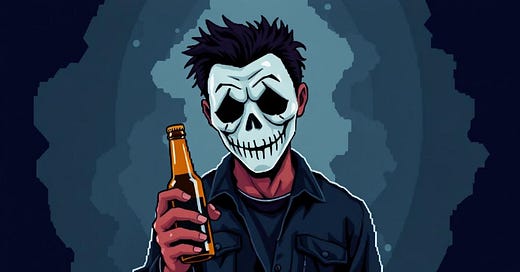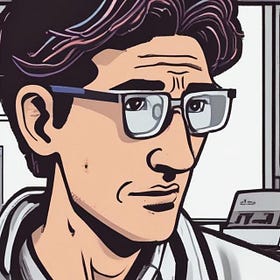How Alcohol Masks Mental Health Issues - and How to Break Free
Alcohol escalates issues, masks problems and creates chaos
Welcome to the AFFathers newsletter on Substack.
I never truly understood how much my drinking was hurting my mental health until I quit. Once I got sober, it became clear just how much alcohol had been affecting me.
For many people, drinking isn’t just something they do for fun, it’s a way of managing stress and the pressures of life. I’ve been there. During my drinking days, I would turn to the bottle to deal with most things.
Bad day at work? Drink.
Money worries? Drink.
Argument with my wife? Drink.
Instead of dealing with issues head-on or addressing problems with a clear head, I would get drunk. But as I’ve found out since; alcohol doesn’t just hide mental health problems - it makes them worse.
I battled multiple mental health issues while I was in active addiction:
Trauma
Anxiety
Depression
However, while it’s hard to know whether they were there before I started drinking - I started drinking heavily in my teens - or whether alcohol created them, my excessive boozing did not help.
When you’re drinking, it’s easy to ignore the real issues bubbling under the surface. Alcohol can create the illusion that everything is fine. It can numb emotions and distract you from feeling ANYTHING. However, this relief is only temporary and comes at a cost.
The more you rely on alcohol, the more those hidden problems grow. What starts as a way to relax can develop into a harmful habit that compounds your struggles. That was my experience - not only did alcohol worsen my existing challenges, but it also created new ones.
On top of those pre-existing issues, over the years of heavy drinking, I developed other struggles to deal with:
Panic attacks
Suicidal thoughts
And how did I deal with them? - with alcohol, of course!
I can look back now and see how crazy it was but at the time I didn’t know what I was doing, or the damage I was doing. It was insane to continue pouring fuel on the fire. Alcohol was masking the issues AND making them worse, and yet I continued for years. And when I finally realised the harm I was doing to myself, I discovered I was locked in a battle with the devil who was determined to keep me drinking.
That’s why I’m incredibly grateful to be sober now and why I continue to share my story.
Getting sober showed me that to truly heal, it’s necessary to confront these issues directly. Breaking free from alcohol means giving yourself the opportunity to identify and address underlying issues, such as unacknowledged emotions, past trauma, or deeper struggles.
It’s about facing the root causes of your struggles instead of masking them.
I also realise how important this is for parents. Being a father, I understand how brutal it can be dealing with struggles on top of managing the demands of parenting, handling family routines, driving children to sports clubs, financial stresses and endlessly having to fix things around the house (maybe that’s just me!)
That’s why I’m so glad to be sober, because mixing parenting problems and life stresses with an alcohol addiction would be unsustainable.
Sobriety helps
Taking that first step to stop drinking can be difficult, but it’s so important. Admitting that alcohol is part of the problem requires courage and is the first move towards recovery. It’s important to remember that recovery is not linear - it takes time and effort. Along the way, you’ll discover healthier ways to cope with life’s difficulties.
Instead of relying on alcohol, finding alternative ways to manage stress is vital. Activities such as exercise, journalling, engaging in creative activities with your children, or having open conversations with someone you trust can make a significant difference.
Navigating Sobriety: Practical Tips for Staying Strong Through Stress
Check out this article for more helps hints to avoid stress - especially in sobriety.
It’s also crucial to recognise that recovery is a gradual process. You don’t need to fix everything all at once. Celebrate small victories, like handling a tough parenting moment without turning to alcohol or attending a recovery support group.
Keep moving forward.
The more you understand how alcohol affects your mind and body, the stronger your commitment to staying on track will become.
Breaking free from alcohol is worth it. Even if you’re not aware of any mental health challenges, stepping away from alcohol can help uncover and address issues you might not have recognised.
When you remove the mask alcohol provides, you give yourself the chance to heal, grow, and build a healthier, more fulfilling life.
Wishing you all a wonderful new year :)
If there is anything you would like to add about the issues highlighted above, or there was something in this article resonated with you, please leave me a comment:
Thank you for reading: “How Alcohol Masks Mental Health Issues - and How to Break Free.”
Here are some useful articles related to today’s post:
Check out the last post: “Ways to Avoid Alcohol this Christmas.”
Before you go, please 🧡 and restack this post on the Substack app.
Take care of yourself and your family,
Roscoe | Alcohol Free Fathers
If you can’t commit to a monthly subscription but still want to support my writing, please click the image below to make a small donation:







I can relate to this.. Thanks for sharing!
Well, for starters, alcohol is a depressant. If a person continually "over-doses" on a depressant drug, they might become... 🤔 Great piece!